Economy
The Growth and Growth of Family-Owned Businesses: the Two Key Pillars of Success

By Kyra Motley and Chelsea Turner
Africa has seen an exponential growth of family-owned businesses (FOBs) in recent years, aligned with a fast-growing ultra-high-net-worth population – a trend that is set to continue on an upward trajectory.
This is particularly true of Nigeria. Nigeria has the largest population in Africa and is a landscape where family businesses are prominent and contribute significantly to the country’s economy. Here, FOBs contribute over $200 billion to the Nigerian economy and one out of two Nigerian businesses is a family business.
FOBs are typically resilient, exemplified by their resistance to recent inflationary pressures experienced in the Nigerian economy. Having experienced a number of challenges as they become established, family businesses are now ripe for growth, pending the stabilisation of the economic climate in the region.
Nigeria is one of the recently coined “Big 5” wealth markets in Africa, which together hold over 90% of the continent’s billionaires, and Africa’s population of high-net-worth individuals is predicted to rise by 42% in the next decade.
Therefore, at a countrywide level, the importance of these businesses to the economy cannot be underestimated, nor their wider contributions to the success of surrounding communities at a local level.
Good governance: a critical pillar for sustainable success
Given family businesses are a staple to the economy, it is therefore cause for concern that only 58% have a form of governance structure, and only 6% have dispute resolution procedures in place. Furthermore, in 2021, only 25% had succession plans and 9% had a family constitution, figures which are unlikely to have shifted notably in this time.
Family businesses must equip themselves with a governance framework to enable the business to progress further. A family constitution can ensure a clear goal for the family business and protect continuity for the business that spans beyond some of the family members themselves. This pre-emptive planning can provide beneficial opportunities for family members to settle into their roles before the practical elements of their positions are required. Another useful tool is shareholder agreements, which can ensure clarity on how the success of the business is maintained, providing peace of mind for families who may be concerned about the challenges to come and changes to follow.
Implementing a forward-thinking governance framework will benefit younger generations, who may themselves progress and lead the business forward. These generations may require specific skills or qualifications to enable them to lead with confidence.
These considerations are inherently important given it is an unfortunate fact that many of these family businesses, which are so important to Africa’s economy, do not manage to survive beyond the third generation.
Securing success through effective succession
The importance of effective succession planning should not be underestimated in combatting the challenges family businesses will undoubtedly encounter, and ensuring there is continued prosperity and success for these businesses and the region as a whole.
The challenges faced by family businesses are not inherently distinct from the challenges non-family businesses face. Family businesses do not hold a unique immunity to the challenges of economic instability, inflation, corruption, and terrorism that exist. These features are also not distinct to Nigeria and are faced by many other businesses globally.
However, in conjunction with these adverse influences, family businesses have a multitude of other considerations. Family businesses, just like every other family, will have disputes between family members. However, these disputes are susceptible to being strained, and complications can arise from contrasting management perspectives, concerns for the business, and dealing with business demands.
Furthermore, families are not fixed, instead altering substantially with time, growing with new generations, and coping with the loss of older generations. Legacy is an important aspect to consider, to withstand the changes and fluctuations of modern times, but most importantly so businesses can thrive through these changes.
The prospect of succession planning can be an aspect that family businesses avoid, yet this can cause significant instability – planning ahead can eradicate some of these fears and threats. Focusing too heavily on the present, without a lens for future generations, can result in these hard efforts being unrealised in the future.
In the unfortunate event someone in the family business becomes unable to continue running the business, there should be a plan in place that clearly sets out the steps that should be taken – these may involve drafting Wills for family members, or potentially establishing a trust structure to ensure shareholdings are passed efficiently.
These considerations are often postponed, yet incapacity and death can, unfortunately, strike suddenly and preparing for moments such as these hold the key to the business’s success and survival.
Ultimately, family businesses have a critical role to play in the Nigerian economy and with the right approaches and frameworks in place, they have the potential to propel their established success forward for generations to come.
Kyra Motley is a Partner at Boodle Hatfield, and Chelsea Turner is a Trainee Solicitor at Boodle Hatfield

Chelsea Turner
Economy
FG Saves N6trn in Fuel Subsidy Payments in 2025—NMDPRA Chief

By Adedapo Adesanya
The chief executive of the Nigerian Midstream and Downstream Petroleum Regulatory Authority (NMDPRA), Mr Saidu Mohammed, has revealed that bold economic reforms by President Bola Tinubu’s administration saved the country over N6 trillion on petroleum product imports in just the first nine months of 2025.
Mr Mohammed disclosed this while speaking at the Nigeria International Energy Summit (NIES) in Abuja, said the savings were the result of full downstream deregulation, harmonisation of the forex market, and the trading of crude and petroleum products in Naira.
He added that these bold moves have created stability in the downstream petroleum market, encouraged investment, and ensured a sufficient supply of petroleum products across the country.
The NMDPRA boss also revealed that the nation’s refining capacity is expected to surpass 1 million barrels per stream day (bpsd) in the medium term.
He said the surge in domestic refining capacity is being driven by a combination of new refinery investments, the rehabilitation of existing Nigerian National Petroleum Company (NNPC) Limited refineries, and strategic private-sector participation.
According to him, the planned investments in other refineries, along with issued Licences to Establish (LTEs) for new facilities, will continue to expand Nigeria’s refining footprint, reducing dependence on imported products and stabilising domestic supply.
He said: “For decades, our downstream value chain has been associated with negative sectoral performance indicators such as infrastructural deficit, weak market structures, sub-optimal supply chain efficiency, inadequate investment, poor regulatory compliance, and unacceptable operational safety and environmental indices.
“Today, I am pleased to affirm that this narrative is rapidly changing and that the sector is truly witnessing the early but irreversible signs of a renaissance-type transformation that is driven by bold reform; enabled by investment; and sustained by effective market and operational regulatory enablement.
“In the few years of the operationalisation of the new legal framework of the Oil and Gas sector in Nigeria (PIA 2021), Nigeria’s downstream sector has evolved into a fully liberalised market and is no longer defined by scarcity and supply uncertainty.
Supply stability has consistently ensured sufficiency of all Petroleum products. The pricing structure of the downstream sector is becoming more driven by the fundamentals of the market and generally attaining the stability level required for encouraging investment in this expansive sector of the economy.
“The supply chain landscape of the sector, which depended significantly on import of nearly all Petroleum Products for a long time, is rapidly transforming with growing supply through the nation’s domestic refining capacity, expanding gas-based alternative fuels, improved logistics, and increased private-sector participation.
“At the heart of this transformation stands the Dangote Petroleum Refinery, the largest single-train refinery in the world with an installed capacity of 650,000 barrels per stream day (bpsd), which is currently contributing a significant portion and in some cases 100 per cent of our domestic requirement of Petroleum Products. The optimal operationalisation of the plant’s installed capacity and future upscaling of the plant is undoubtedly needed to fulfil the national aspirations of making Nigeria a regional and continental energy hub.
“The capacity for enhanced domestic supply of Petroleum product in Nigeria will continue to grow as the planned investments in our refinery sector mature. We are optimistic that the issued Licences to Establish (LTEs) refineries, which are being progressed through various levels of completion, coupled with the rehabilitation of the NNPCL refineries, will improve the overall installed refining capacity in Nigeria to well over 1 million bpsd in the medium term.
“The bold economic reforms of President Bola Tinubu have created the renaissance that the downstream sector is enjoying and would continue to leverage upon for sustained sectoral growth in the future. The cumulative impact of the full deregulation of the downstream sector, the harmonisation of the forex market, the incentivization and deepening the use of gas and the trading of crude and product in Naira has reduced the fiscal economic losses of importing Petroleum Product by over N6 trillion in the 1st nine months of 2025.”
Economy
Nigeria Targets 10bscfd Gas Production in Next Four Years

By Adedapo Adesanya
The federal government says Nigeria is targeting gas production of 10 billion standard cubic feet per day (bscfd) by 2030, positioning natural gas as a cornerstone of national energy security and economic prosperity.
The Minister of State for Petroleum Resources (Gas), Mr Ekperikpe Ekpo, said this while delivering a ministerial address at the ninth Nigeria International Energy Summit (NIES) 2026 in Abuja.
The Minister said the government’s efforts were yielding tangible results, with Nigeria’s gas production maintaining an upward trajectory in 2025, averaging between 7.5 and 7.6bscfd.
He disclosed that domestic gas supply exceeded two bscfd for the first time, marking a historic milestone for power generation, industrial use and household consumption.
The Minister also said significant progress in environmental performance, with gas flaring reduced to some of the lowest levels recorded in recent years, in line with Nigeria’s commitment to end routine gas flaring by 2030.
He noted that investor confidence in the gas sector had been strengthened, citing Final Investment Decisions (FIDs) in key upstream gas projects supported by improved regulatory clarity under the Petroleum Industry Act (PIA).
“Across the midstream and downstream segments, pipeline infrastructure, processing facilities and gas-to-power projects have expanded, improving connectivity, boosting domestic utilisation and supporting cleaner cooking solutions, job creation and industrial stability.
“Under President Bola Tinubu’s Renewed Hope Agenda, government policy prioritises the expansion of domestic gas infrastructure while strengthening Nigeria’s presence in regional and global gas markets.
“This includes facilitating investments in gas processing, storage and distribution, as well as accelerating gas-to-power projects aimed at addressing energy poverty and enhancing industrial competitiveness,” he said.
The minister emphasised that Nigeria’s energy future was inseparable from peace, partnership and shared responsibility, calling on governments, investors, development partners, host communities and civil society to move from dialogue to decisive action.
“Our collective task is to build an energy system that powers prosperity, strengthens stability and supports regional integration,” he said.
He said Nigeria’s energy strategy is firmly aligned with global energy transition realities while responding to Africa’s unique development challenges, including widespread energy poverty, limited industrial capacity and inadequate access to reliable power.
“While the world moves towards lower-carbon systems, Africa must pursue a transition that is not only green, but also just, inclusive and development-driven.
“Nigeria is leveraging its abundant natural gas resources to balance climate responsibility with economic development, positioning gas as the backbone of industrial growth, job creation and expanded energy access,” he said.
Economy
Transcorp, DMO, CardinalStone, Chapel Hill Denham, Others Win at NGX Made of Africa Awards

By Aduragbemi Omiyale
The 2025 Made of Africa Awards, hosted by Nigerian Exchange (NGX) Group Plc, paraded an array of winners, including brokers, issuing houses, trustees, fund managers, listed companies, and other market participants.
The event was to reward excellence in value delivery, compliance, and market impact, with Transcorp, the Debt Management Office, CardinalStone, Chapel Hill Denham, and MTN Nigeria Communications as recipients.
Business Post reports that the other recipients were First Trustees Limited as the Best Trustees in Terms of Deal Value, Legend Internet as the Market Debut Excellence award winner.
Further, CardinalStone Securities emerged as Equity Trader of the Year and Broker of the Year, Capital Express Securities won ETPs Trader of the Year, and Stanbic IBTC Stockbrokers was named Fixed Income Trader of the Year. Chapel Hill Denham received awards for Fund Manager with the Largest Listed Fund Size and Market Operator with the Highest Value of Foreign Portfolio Investment Transactions.
Mainstreet Capital and APT Securities and Funds jointly won Issuing House with the Highest Number of Primary Market Equity Transactions, while Anchoria Advisory Services led in corporate bond issuances. Dangote Cement was named Best Issuer in Terms of Fixed Income Listings, BUA Cement received the award for Most Compliant Listed Company, and Transnational Corporation Plc was honoured for Capital Market Excellence in Equity. Network Capital was named the Most Compliant Trading License Holder, United Capital Securities won the Best Sponsoring Trading License Holder and Banwo and Ighodalo received recognition for legal advisory value in capital market transactions.
Special recognition went to the Debt Management Office for fixed income market development and to the Capital Markets Correspondence Association of Nigeria for capital market reporting, and Lambeth Capital/Bamboo Systems Technology were recognised for onboarding the highest number of new retail investor accounts.
The chairman of NGX Group, Mr Umaru Kwairanga, said the awards underscore the role of market stakeholders in strengthening investor confidence and improving market standards.
“Their achievements set a benchmark for performance, integrity and innovation across the capital market,” he said, adding that sustaining this level of discipline and transparency is essential to maintaining the trust of both domestic and international investors in Nigeria’s financial markets.
The chief executive of NGX Group, Mr Temi Popoola, said, “Operational efficiency and cooperation across the ecosystem are increasingly important as trading activity diversifies and investor expectations continue to rise.”
On his part, the Executive Commissioner for Operations at the Securities and Exchange Commission (SEC), Mr Bola Ajomale, said the awards underscore the value of compliance and transparency in market development.
“Recognition through the Made of Africa Awards reinforces the importance of adherence to market rules and standards. When operators demonstrate accountability and professionalism, it strengthens investor confidence, ensures market integrity, and supports sustainable growth across Nigeria’s financial markets,” he said.
The chief executive of NGX Limited, Mr Jude Chiemeka, said recognising strong performance across the ecosystem supports deeper market participation and long-term capital mobilisation.
-

 Feature/OPED6 years ago
Feature/OPED6 years agoDavos was Different this year
-
Travel/Tourism9 years ago
Lagos Seals Western Lodge Hotel In Ikorodu
-

 Showbiz3 years ago
Showbiz3 years agoEstranged Lover Releases Videos of Empress Njamah Bathing
-

 Banking8 years ago
Banking8 years agoSort Codes of GTBank Branches in Nigeria
-

 Economy3 years ago
Economy3 years agoSubsidy Removal: CNG at N130 Per Litre Cheaper Than Petrol—IPMAN
-

 Banking3 years ago
Banking3 years agoSort Codes of UBA Branches in Nigeria
-

 Banking3 years ago
Banking3 years agoFirst Bank Announces Planned Downtime
-

 Sports3 years ago
Sports3 years agoHighest Paid Nigerian Footballer – How Much Do Nigerian Footballers Earn






















